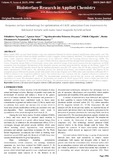Please use this identifier to cite or link to this item:
https://cris.library.msu.ac.zw//handle/11408/3748Full metadata record
| DC Field | Value | Language |
|---|---|---|
| dc.contributor.author | Ngwenya, Sithulisiwe | - |
| dc.contributor.author | Guyo, Upenyu | - |
| dc.contributor.author | Zinyama, Ngceboyakwethu Primrose | - |
| dc.contributor.author | Chigondo, Fidelis | - |
| dc.contributor.author | Nyamunda, Benias Chomunorwa | - |
| dc.contributor.author | Muchanyereyi, Netai | - |
| dc.date.accessioned | 2019-12-10T07:28:36Z | - |
| dc.date.available | 2019-12-10T07:28:36Z | - |
| dc.date.issued | 2019 | - |
| dc.identifier.issn | 2069-5837 | - |
| dc.identifier.uri | http://hdl.handle.net/11408/3748 | - |
| dc.description.abstract | Maize tassels (MT), an agro-based biomass waste was carbonised followed by thermo-chemical modification using tartaric acid. The functionalized activated carbon was further modified to yield a magnetic hybrid composite adsorbent. The adsorbent was characterized using Fourier transform infrared (FTIR) spectroscopy, X-ray diffraction (XRD) and Scanning Electron Microscopy (SEM). The adsorbent was evaluated for its efficiency to remove Cd(II) ions from aqueous solutions through batch adsorption studies following a Central Composite Design. Effects of solution pH, contact time, adsorbent dosage, initial metal concentration and temperatureon Cd(II) adsorption were investigated. Optimization of the adsorption process was done using desirability function on the Design Expert V11 software. The desirability function showed that the optimum parameters were pH 5.29, contact time (67.50 min), dosage (0.575 g) and initial concentration (152.50 mg/L). The adsorption process was analysed using kinetic and isotherm models. Thekinetics of the adsorption process followed the pseudo-second-order model (lowest sum of square error (SSE) values and correlation coefficients (R2) > 0.999) in addition to the intraparticle diffusion model. The isotherm data wereconsistent with the Langmuir isotherm as evidenced by the highest correlation coefficient (R2= 0.998). The thermodynamic parameters showed that the process was endothermic and spontaneous in nature. The adsorption capacity of the adsorbent was found to be 188.68 mg/g at 20 ⁰C which is higher than that of the previously reported magnetic maize tassel hybrid (52.05 mg/g). The adsorbent showed good removal efficiency on real effluent samples. | en_US |
| dc.language.iso | en | en_US |
| dc.publisher | Biointerface Research | en_US |
| dc.relation.ispartofseries | ;Volume 9, Issue 4 | - |
| dc.subject | Tartaric acid-maize tassel magnetic hybrid | en_US |
| dc.subject | Cd(II) adsorption | en_US |
| dc.subject | Response surface methodology | en_US |
| dc.subject | Isotherm | en_US |
| dc.title | Response surface methodology for optimization of Cd(II) adsorption from wastewaters by fabricated tartaric acid-maize tassel magnetic hybrid sorbent | en_US |
| dc.type | Article | en_US |
| item.grantfulltext | open | - |
| item.fulltext | With Fulltext | - |
| item.openairecristype | http://purl.org/coar/resource_type/c_18cf | - |
| item.languageiso639-1 | en | - |
| item.openairetype | Article | - |
| item.cerifentitytype | Publications | - |
| Appears in Collections: | Research Papers | |
Files in This Item:
| File | Description | Size | Format | |
|---|---|---|---|---|
| Response surface methodology for optimization of Cd(II) adsorption from wastewaters.pdf | 1.04 MB | Adobe PDF |  View/Open |
Page view(s)
108
checked on Nov 28, 2024
Download(s)
34
checked on Nov 28, 2024
Google ScholarTM
Check
Items in MSUIR are protected by copyright, with all rights reserved, unless otherwise indicated.



